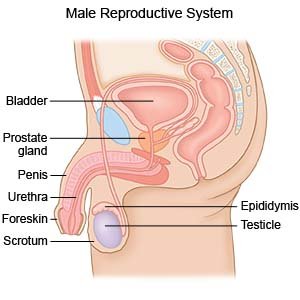Urinary Retention in Men
Medically reviewed by Drugs.com. Last updated on Aug 4, 2025.
Urinary retention is a condition that develops when your bladder does not empty completely when you urinate.
 |
DISCHARGE INSTRUCTIONS:
Medicines:
- Medicines can help decrease the size of your prostate, fight infection, and help you urinate more easily.
- Take your medicine as directed. Contact your healthcare provider if you think your medicine is not helping or if you have side effects. Tell your provider if you are allergic to any medicine. Keep a list of the medicines, vitamins, and herbs you take. Include the amounts, and when and why you take them. Bring the list or the pill bottles to follow-up visits. Carry your medicine list with you in case of an emergency.
Foley catheter care:
You may need a Foley catheter for up to 2 weeks at home. Healthcare providers will give you a smaller leg bag to collect urine. Keep the bag below your waist. This will prevent urine from flowing back into your bladder and causing an infection or other problems. Also, keep the tube free of kinks so the urine will drain properly. Do not pull on the catheter. This can cause pain and bleeding, and may cause the catheter to come out. Ask your healthcare provider or urologist for more information on Foley catheter care.
Related medications
Treatment options
The following list of medications are related to or used in the treatment of this condition.
Urinate regularly:
When your catheter is removed, do not let your bladder become too full before you urinate. Set regular times each day to urinate. Urinate as soon as you feel the need or at least every 3 hours while you are awake. Do not drink liquids before you go to bed. Urinate right before you go to bed.
Follow up with your healthcare provider or urologist as directed:
Write down your questions so you remember to ask them during your visits.
Contact your healthcare provider or urologist if:
- You have a fever.
- You have pain when you urinate.
- You have blood in your urine.
- You have problems with your catheter.
- You have questions or concerns about your condition or care.
Return to the emergency department if:
- You have severe abdominal pain.
- You are breathing faster than usual.
- Your heartbeat is faster than usual.
- Your face, hands, feet, or ankles are swollen.
© Copyright Merative 2025 Information is for End User's use only and may not be sold, redistributed or otherwise used for commercial purposes.
The above information is an educational aid only. It is not intended as medical advice for individual conditions or treatments. Talk to your doctor, nurse or pharmacist before following any medical regimen to see if it is safe and effective for you.
Learn more about Urinary Retention
- Anticholinergic Drugs to Avoid in the Elderly
- Enlarged Prostate (BPH) Medications and Alcohol Interactions
Treatment options
Care guides
Symptoms and treatments
Medicine.com guides (external)
Further information
Always consult your healthcare provider to ensure the information displayed on this page applies to your personal circumstances.
